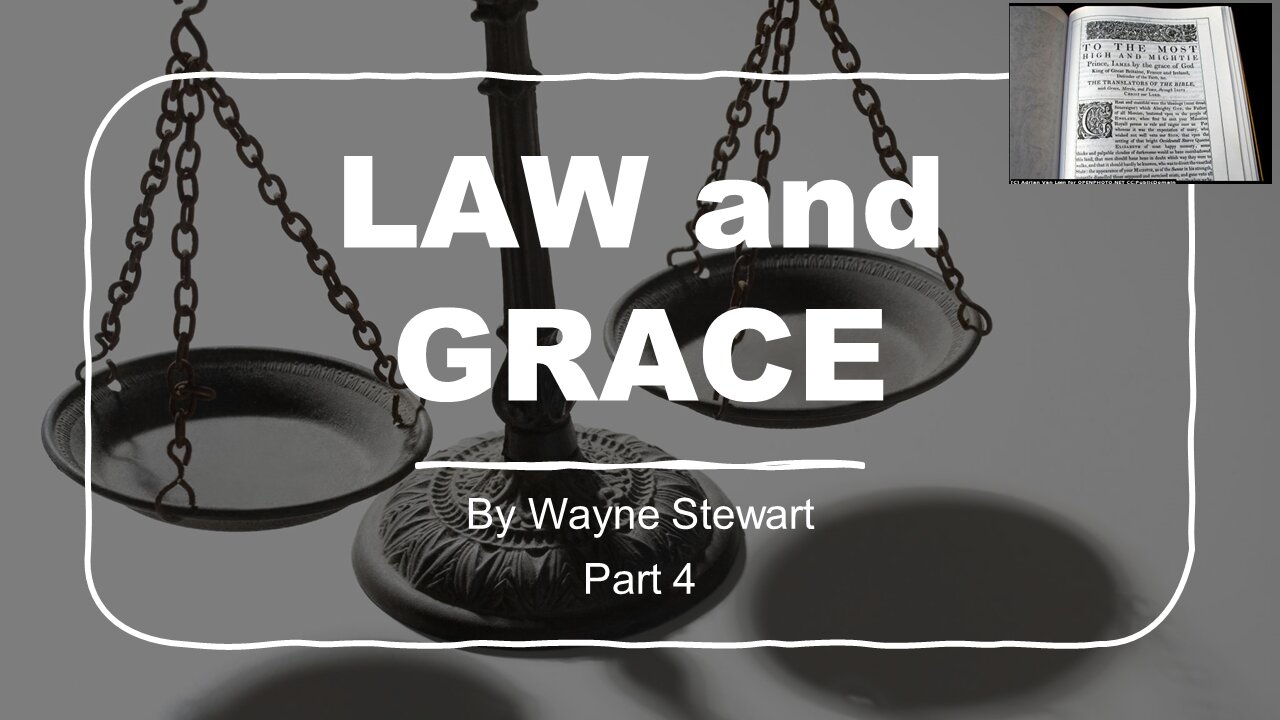Premium Only Content

Law and Grace - Part 4
The lesson on November 13, 2022 was part 4 of the “Law and Grace” study. Wayne took time to review what we have previously learned but he continued with focusing on what the Apostle Paul said in Romans 3:31 “Do we then make void the law through faith? God forbid: yea, we establish the law.” We find out how in Romans 4. We looked at the Greek word “καταργοῦμεν” for abolish or “make none effect” and reviewed Luke 13:7; Romans 3:3, 31; 4:14 just to cover a few. He then explained that we have many types in the Old Testament and the Law of Christ and that they form a feedback loop. The more you know of Christ, the more you see types in the law showing his role in justification and many others. When PAul explains to Timothy in 1 Timothy 1:8-11 KJV, he emphasized the Law is good… and if there be any other thing that is contrary to sound doctrine which was committed to Paul’s trust. It seems that PAul wants us to use it lawfully. We need to find out how. Wayne showed us how the Temple was built with a vail separating the holiest place that was ripped from top to bottom. In the Acts period, the Jew and Gentile were two and the Jew came first. When the Mystery was revealed after Acts, we learn of the middle wall of partition is now gone because we are made as one new man, so making peace. The lesson ended with looking at Ephesians 2:15 showing that “having abolished in his flesh the enmity, even the law of commandments contained in ordinances. The lessons to follow will dive deep into these ordinances.
The scripture reading was from 2 Cor 3:6-13 KJV “6 Who also hath made us able ministers of the new testament; not of the letter, but of the spirit: for the letter killeth, but the spirit giveth life. 7 But if the ministration of death, written and engraven in stones, was glorious, so that the children of Israel could not stedfastly behold the face of Moses for the glory of his countenance; which glory was to be done away: 8 How shall not the ministration of the spirit be rather glorious? 9 For if the ministration of condemnation be glory, much more doth the ministration of righteousness exceed in glory. 10 For even that which was made glorious had no glory in this respect, by reason of the glory that excelleth. 11 For if that which is done away was glorious, much more that which remaineth is glorious. 12 Seeing then that we have such hope, we use great plainness of speech: 13 And not as Moses, which put a vail over his face, that the children of Israel could not stedfastly look to the end of that which is abolished:”
-
 LIVE
LIVE
Barry Cunningham
5 hours agoCBS CAUGHT AGAIN! CHICAGO A MESS! LISA COOK IS COOKED AND MORE LABOR DAY NEWS!
10,580 watching -
 54:40
54:40
BonginoReport
23 hours agoLABOR DAY SPECIAL! The Best of Nightly Scroll - Nightly Scroll w/ Hayley Caronia (Ep.124)
26.3K4 -
 1:06:10
1:06:10
Russell Brand
7 hours agoThe Greatest Lie Ever Told? - SF625
42.8K53 -
 LIVE
LIVE
Dr Disrespect
7 hours ago🔴LIVE - DR DISRESPECT - TRIPLE THREAT CHALLENGE - WINNING AT EVERYTHING
976 watching -
 1:41:06
1:41:06
vivafrei
4 hours agoTrump Changing Tune on Operation Warp Speed? CBC Promoting Propaganda? Shiloh Hendrix Update & MORE!
171K70 -
 LIVE
LIVE
SavageJayGatsby
1 hour agoLet's Play: Pacific Drive || $300 Weekly Goal - Spicy Bite Saturday || Teen Drinkin is Very Bad
19 watching -
 LIVE
LIVE
The Mike Schwartz Show
2 hours agoTHE MIKE SCHWARTZ SHOW Evening Edition 09-01-2025
81 watching -
 46:25
46:25
The Quartering
7 hours agoMeta PC Winner, Trump Ruins Libs Dark Fantasy & Raja Jackson Case Heats Up!
127K56 -
 LIVE
LIVE
Rallied
5 hours ago $4.88 earnedWarzone Challenges w/ Doc & Bob
176 watching -
 LIVE
LIVE
StoneMountain64
5 hours agoNew Missions for Battlefield 6 Unlocks (+New Mouse and Keyboard)
215 watching